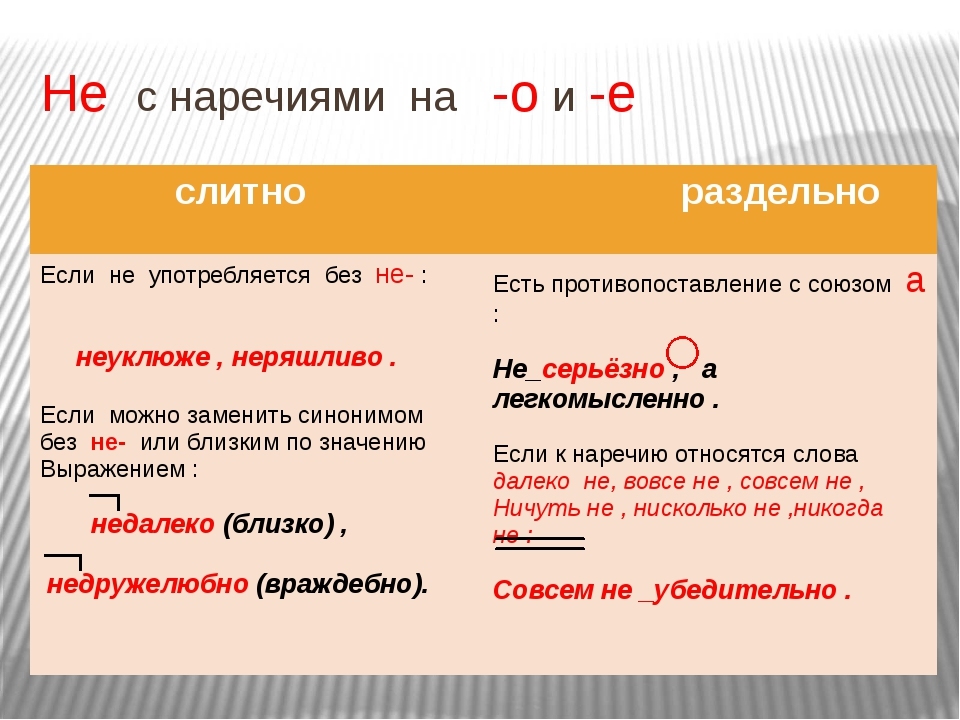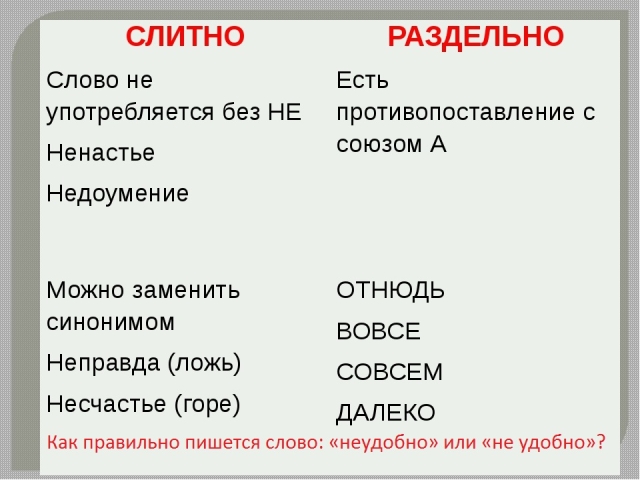Learning the Russian language together. Read the article to know how to write words correctly.
Content
- How is the word correctly written: “inconvenient” or “not convenient”?
- In what cases is "inconvenient" written together?
- In what cases is “not convenient” written separately?
- How to write: “inconvenient” or “not convenient”, together or separately?
- Video: Russian language. The spelling of the particle is “not” with different parts of speech. Online training center "Foxford"
Not everyone is able to thoroughly learn the Russian language. After all, it is complicated for perception, and you need to remember a lot of rules in order to know how this or that word is written. Sometimes the literal cramming of the rules is not always enough, you must learn to understand them. This article will tell you how the word is written: inconvenient - along with “not” or separately.
How is the word correctly written: “inconvenient” or “not convenient”?

Before analyzing the rule on the spelling of the word, it is worth noting that it can be a short adjective or adverb. They need to be written along with the prefix “not”, if there is a statement, and when denied, “not” will be a particle and therefore the word is written separately.
So, we will analyze in more detail how the word should be used correctly: “inconvenient” or “not convenient”:
- Use with the prefix,if this adverb can be replaced with a synonym for statements without the prefix "not." For example, “uncomfortable”, “difficult” and so on.
- Use with the prefix,if the proposal has dialects of measure and degree - “very”, “extremely”, “very”. For example, "It will be very inconvenient for you to talk to them."
- "Not" is used separatelywith complete denial in the sentence. The pronoun will be strengthened with "not." For example, "you are not at all convenient."
- "Not" is used separately, If it makes sense to contrast with the Union "A". For example, "It is not convenient for me to be here, but very uncomfortable."
Remember: The opposition with the Union “A” means that the word will be used in the sentence separately. However, there are cases when contrasts are used with the “but” union.
For example, "it was inconvenient to sit for children, but the teacher told so interestingly that no one thought about discomfort." In this sentence, signs without denial are simultaneously attributed action. Therefore, the word "inconvenient" is used together with the prefix.
In what cases is "inconvenient" written together?

Now let's analyze in detail so that you can remember and fix the material. In what cases is "inconvenient" written together?
- Consumption with the prefix In the sentence, if the word can be replaced with an affirmative synonym without the prefix “not”. For example, “uncomfortable”, “difficult” and so on. For example, "I am uncomfortable to perform these exercises at all." We can say: "It is difficult or uncomfortable for me to perform exercises at all."
- Consumption with the prefix, if the proposal has dialects of measure and degree - “very”, “extremely”, “very”. For example, "it will be very inconvenient for him to come to visit them without an invitation."
Try to still make an offer with the word “inconvenient” and explain why, in this particular case, it needs to be written along with “not”.
In what cases is “not convenient” written separately?

In the case of separate use of this word, the rule is a little more complicated, both children, and even adults are often confused and cannot say exactly how to write with or without this particle.
In what cases is “not convenient” written without a particle? It is important to remember the following:
- "Not" is used separately If there is a point in denial in the sentence. It usually intensifies with a pronoun with "not." These pronouns can be very different: not at all, by no means, far from and so on. For example, "I am far from being comfortable here."
- "Not" is used separately In the event that there is a contrast with the Union “A”. For example, "it was not convenient for us there to stand there, but too uncomfortable."
Also remember this exception to the rule: The opposition with the Union “A” means that the word will be used in the sentence separately from “not”. However, there are cases when contrasts are used with the “but” union. For example, "people were uncomfortable there, but the speaker was very competent and interesting that no one left the audience." In this sentence, the action is simultaneously used with signs of denial and without it. Therefore, the word "inconvenient" is written together.
How to write: “inconvenient” or “not convenient”, together or separately?

For spelling adjectives with “NO”, use the same rules as for adverbs with this prefix or particle. How to write: “inconvenient” or “not convenient”, together or separately?
- Consumption with the prefixu the adjective will be if it can be replaced with an affirmative synonym without the prefix "not". For example, “uncomfortable”, “complex”, “difficult” and so on. For example: "The chair was inconvenient."
- Consumption with the prefixu the adjective will be, if the proposal has dialects of measure and degree - “very”, “extremely”, “very”. For example, "I am an extremely uncomfortable suit."
- "Not" is used separately The word is written when denied in the sentence. It can intensify the pronoun with "not." For example, "this high microphone is not at all comfortable."
- "Not" is used separatelythis word needs to be written if there is a contrast with the Union “A”. For example, "I bought not comfortable shoes, but very uncomfortable."
Also remember the rule and the use of oppositions with the union “but”: The opposition with the Union “A” means that the word will be used in the sentence separately. However, there are cases when contrasts are used with the “but” union.
For example: “The children were driving in an uncomfortable bus, but they so wanted this tour that no one complained about discomfort.” In this sentence, signs without denial are simultaneously attributed action. Therefore, the word "inconvenient" is used together.







